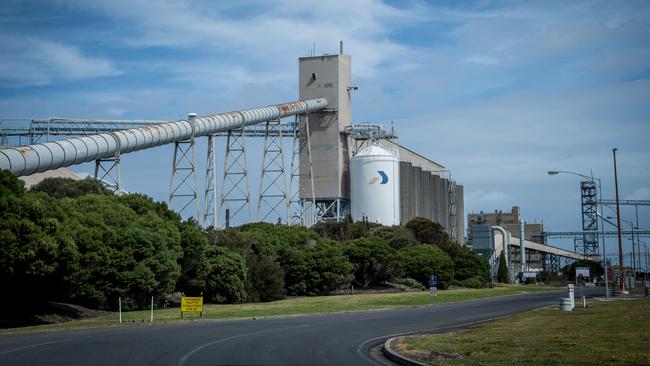Calls to scrap Victoria’s smelter subsidy
A Victorian government land tax designed to subsidise the Portland aluminium smelter has now hit $170m a year.

A Victorian government land tax designed to subsidise the Portland aluminium smelter has now hit $170m a year as talks continue about the future of the under-pressure industrial hub.
The accounts of the owner of Victoria’s poles and wires network, AusNet, show the Victorian government collected $170.6m from the so-called “easement tax” in 2019 — a $34.2m jump on the previous year.
The tax is passed straight through to Victorian households and businesses by AusNet and now makes up almost 70 per cent of the total costs of operating its transmission network, according to the company.
The easement tax was introduced in 2004 as a replacement for the Smelter Reduction Amount — colloquially known as the Alcoa levy, a straight charge on wholesale electricity charges originally set at $2 a megawatt hour — after Smorgon Steel challenged it in the High Court as an unlawful excise on businesses.
Victorian Treasurer Tim Pallas has repeatedly said the easement tax is no longer used solely as a means of paying for the state’s subsidy of Portland’s operating costs — the $170m it now collects is more than three times the annual costs of the current package — but is used to improve Victoria’s energy system across the state.
A spokesman for Mr Pallas said the Victorian government was continuing to work with Alcoa on options for a “more sustainable long-term footing for the smelter”.
“Land tax revenue is used by the government to fund the services and infrastructure that Victorians rely on,” he said.
But with the government’s four-year $200m subsidy package due to expire in mid-2021, and Portland under fresh pressure from falling aluminium prices, the easement tax is again likely to become a focus of discussions as energy giant AGL seeks permission from the ACCC to form a consortium of power generators to offer discounted prices to the smelter to keep it running.
Grattan Institute energy program director Tony Wood says the tax should be scrapped.
“It was a completely artificial arrangement and surely the rationale for it has now passed and we should stop it,” he said.
Federal Education Minister Dan Tehan, whose Wannon electorate includes Portland, said he hoped AGL’s plan would help secure the future of the facility.
“Obviously, we need to be doing everything we can to ensure the future of the smelter,” Mr Tehan told The Australian. “The proposition being put forward by AGL and the other power providers seems eminently sensible. And I hope it will lead to us getting an agreement that will ensure the future viability of the smelter and the people it employs both directly and indirectly.”
Portland is owned by Alcoa, ASX-listed Alumina, which jointly control 55 per cent of the operation, along with Japan’s Marubeni and China’s CITIC Resources, each with a 22.5 per cent stake.
As an unincorporated joint venture, the smelter does not file annual accounts with the Australian Securities & Investments Commission. But Alumina’s annual accounts, filed in February, put its 55 per cent share of the smelter before tax losses at $US20m, suggesting the partners together wore losses of about $US36.4m.
In 2019, aluminium prices averaged about $US1799 a tonne, according to Alumina’s annual report, but plunged sharply on the London Metals Exchange when the coronavirus crisis closed factories around the globe and hit demand for the metal.
Aluminium bottomed out at close to $US1420 a tonne in April, and is now trading at about $US1515 a tonne.
The smelter’s owners have consistently said a cheap energy deal is needed to keep Portland open, and last week operator Alcoa launched talks with unions and the Spanish government over the potential closure of its San Ciprian smelter citing “high energy costs and low aluminium prices”.
AGL has hinted that governments would be reluctant to let the Portland and Tomago aluminium smelters collapse in a post-COVID-19 environment.
The power giant supplies electricity to Portland from its Loy Yang A coal plant and NSW’s Tomago facility from Liddell, which have both suffered losses with the facilities struggling to compete internationally from high energy costs.

To join the conversation, please log in. Don't have an account? Register
Join the conversation, you are commenting as Logout